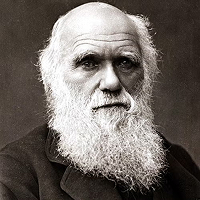Quotes By Charles Darwin

Naturalist And Geologist
Charles Darwin
Feb 12, 1809 - Apr 19, 1882
A grain in the balance will determine which individual shall live and which shall die - which variety or species shall increase in number, and which shall decrease, or finally become extinct.
In the distant future I see open fields for far more important researches. Psychology will be based on a new foundation, that of the necessary acquirement of each mental power and capacity by gradation. Light will be thrown on the origin of man and his history.
But then arises the doubt, can the mind of man, which has, as I fully believe been developed from a mind as low as that possessed by the lowest animal, be trusted when it draws such grand conclusions?
Englishmen rarely cry, except under the pressure of the acutest grief; whereas in some parts of the Continent the men shed tears much more readily and freely.
I have stated, that in the thirteen species of ground-finches, a nearly perfect gradation may be traced, from a beak extraordinarily thick, to one so fine, that it may be compared to that of a warbler.
What wretched doings come from the ardor of fame; the love of truth alone would never make one man attack another bitterly.
The earthquake, however, must be to every one a most impressive event: the earth, considered from our earliest childhood as the type of solidity, has oscillated like a thin crust beneath our feet; and in seeing the laboured works of man in a moment overthrown, we feel the insignificance of his boasted power.
Such simple instincts as bees making a beehive could be sufficient to overthrow my whole theory.
The limit of man's knowledge in any subject possesses a high interest which is perhaps increased by its close neighbourhood to the realms of imagination.
I do not believe, as we shall presently see, that all our dogs have descended from any one wild species; but, in the case of some other domestic races, there is presumptive, or even strong, evidence in favour of this view.
Man could no longer be regarded as the Lord of Creation, a being apart from the rest of nature. He was merely the representative of one among many Families of the order Primates in the class Mammalia.
Man has an instinctive tendency to speak, as we see in the babble of our young children, but no child has an instinctive tendency to bake, brew, or write.
Sexual selection acts in a less rigorous manner than natural selection. The latter produces its effects by the life or death at all ages of the more or less successful individuals.
I am fully convinced that species are not immutable; but that those belonging to what are called the same genera are lineal descendants of some other and generally extinct species, in the same manner as the acknowledged varieties of any one species are the descendants of that species. Furthermore, I am convinced that natural selection has been the most important, but not the exclusive, means of modification.
This preservation of favourable variations and the rejection of injurious variations, I call Natural Selection.
Certainly, no fact in the long history of the world is so startling as the wide and repeated exterminations of its inhabitants.
Hence if man goes on selecting, and thus augmenting, any peculiarity, he will almost certainly modify unintentionally other parts of the structure, owing to the mysterious laws of correlation.
The great variability of all the external differences between the races of man, likewise indicates that they cannot be of much importance; for if important, they would long ago have been either fixed and preserved, or eliminated.
How odd it is that anyone should not see that all observation must be for or against some view if it is to be of any service!
Popular Authors










